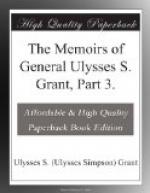As soon as the explosion took place the crater was seized by two regiments of our troops who were near by, under cover, where they had been placed for the express purpose. The enemy made a desperate effort to expel them, but failed, and soon retired behind the new line. From here, however, they threw hand-grenades, which did some execution. The compliment was returned by our men, but not with so much effect. The enemy could lay their grenades on the parapet, which alone divided the contestants, and roll them down upon us; while from our side they had to be thrown over the parapet, which was at considerable elevation. During the night we made efforts to secure our position in the crater against the missiles of the enemy, so as to run trenches along the outer base of their parapet, right and left; but the enemy continued throwing their grenades, and brought boxes of field ammunition (shells), the fuses of which they would light with portfires, and throw them by hand into our ranks. We found it impossible to continue this work. Another mine was consequently started which was exploded on the 1st of July, destroying an entire rebel redan, killing and wounding a considerable number of its occupants and leaving an immense chasm where it stood. No attempt to charge was made this time, the experience of the 25th admonishing us. Our loss in the first affair was about thirty killed and wounded. The enemy must have lost more in the two explosions than we did in the first. We lost none in the second.
From this time forward the work of mining and pushing our position nearer to the enemy was prosecuted with vigor, and I determined to explode no more mines until we were ready to explode a number at different points and assault immediately after. We were up now at three different points, one in front of each corps, to where only the parapet of the enemy divided us.
At this time an intercepted dispatch from Johnston to Pemberton informed me that Johnston intended to make a determined attack upon us in order to relieve the garrison at Vicksburg. I knew the garrison would make no formidable effort to relieve itself. The picket lines were so close to each other—where there was space enough between the lines to post pickets—that the men could converse. On the 21st of June I was informed, through this means, that Pemberton was preparing to escape, by crossing to the Louisiana side under cover of night; that he had employed workmen in making boats for that purpose; that the men had been canvassed to ascertain if they would make an assault on the “Yankees” to cut their way out; that they had refused, and almost mutinied, because their commander would not surrender and relieve their sufferings, and had only been pacified by the assurance that boats enough would be finished in a week to carry them all over. The rebel pickets also said that houses in the city had been pulled down to get material to build these boats with. Afterwards this story was verified: on entering the city we found a large number of very rudely constructed boats.




